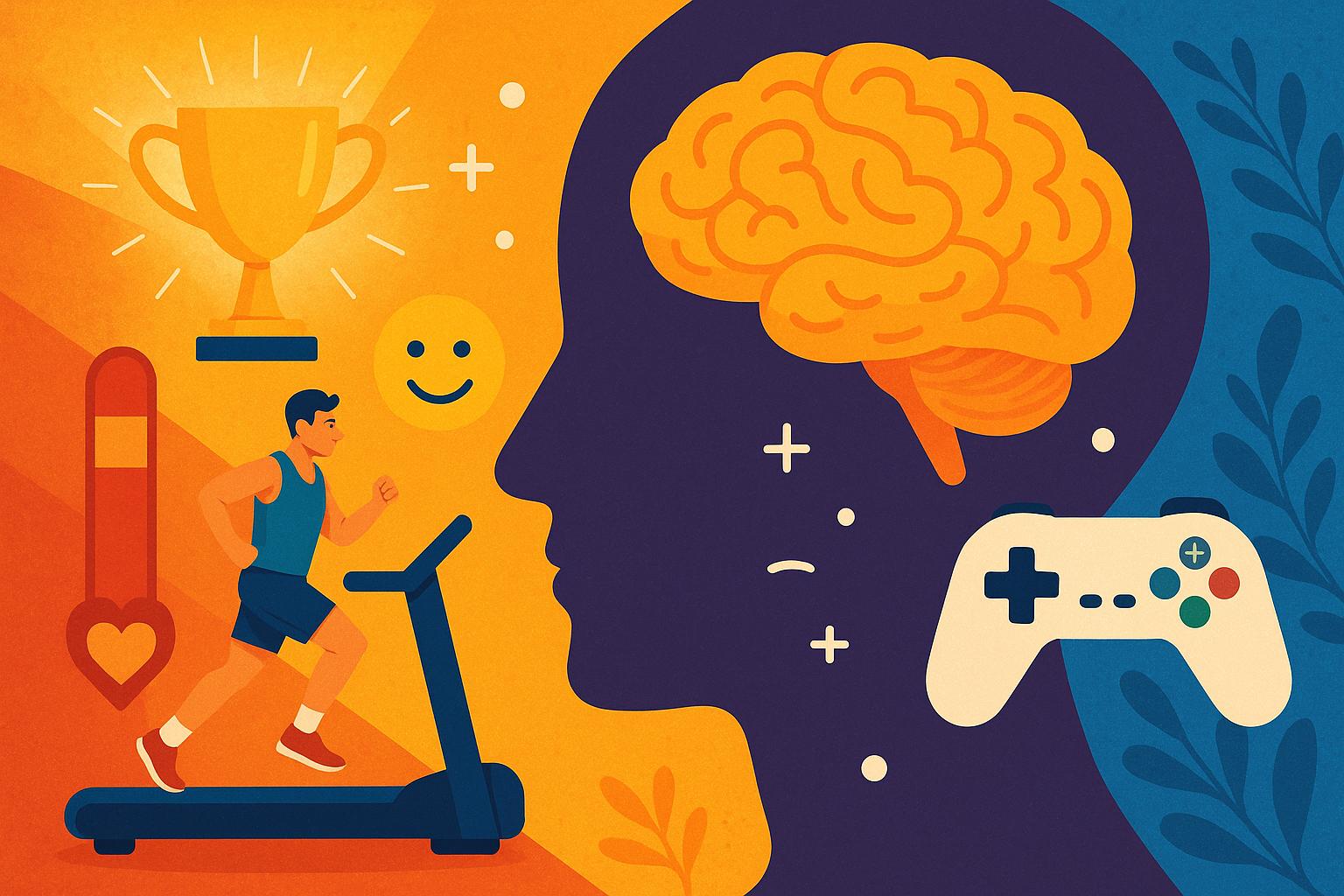The Power of Tracking
Exercise can often feel like a daunting task, especially when you’re just starting your fitness journey or struggling to maintain motivation. However, the advent of fitness trackers has revolutionized the way we approach exercise, making it more engaging, rewarding, and even addictive (in the best possible way). Fitness trackers are no longer just tools to monitor your steps or calorie burn; they have evolved into powerful companions that push you to achieve more, celebrate your progress, and help you develop lasting habits. By providing real-time data, setting personal challenges, and offering a social component, fitness trackers have found a way to make exercise an activity that you look forward to rather than dread.
The Science Behind Fitness Addiction
It may sound counterintuitive, but exercise can become addictive when the right elements are in place. The key lies in the way our brains respond to rewards, challenges, and progress tracking. Fitness trackers tap into these psychological triggers, transforming what could be a boring, repetitive task into a dynamic and rewarding experience.
The brain loves rewards. When you achieve a goal, whether it’s completing a workout, hitting a step count, or reaching a personal best, your brain releases dopamine—the “feel-good” neurotransmitter. Fitness trackers, with their constant feedback, give you a steady stream of these small wins. Each notification, achievement, and milestone creates a positive feedback loop, encouraging you to continue exercising.
Furthermore, the sense of progress and accomplishment can trigger a competitive spirit, whether against yourself or others. With fitness trackers, you are constantly pushing your boundaries, setting new goals, and striving to outdo your previous efforts. This desire for progress is deeply ingrained in human nature, making it an ideal catalyst for exercise addiction.
How Fitness Trackers Turn Workouts into a Game
One of the most powerful aspects of fitness trackers is the way they turn exercise into a game. Through gamification—an approach borrowed from the world of video games—fitness trackers add layers of excitement, competition, and achievement to your workout routine. Rather than simply running on a treadmill or lifting weights, fitness trackers transform these activities into challenges that offer rewards for each accomplishment. Whether it’s collecting badges, earning points, or unlocking levels, fitness trackers create a sense of adventure that keeps you engaged and motivated.
Fitness trackers allow you to set goals and track your progress in real-time. For example, you might aim to complete 10,000 steps a day or burn a specific number of calories. As you move closer to these goals, the tracker provides feedback that keeps you motivated. This progress is not just about numbers; it’s about visualizing your journey and seeing how far you’ve come. You might unlock a new achievement, get a congratulatory notification, or hit a personal best—and these small rewards make you want to keep going.
In some cases, fitness trackers allow you to compete with friends or others in your social circle. Whether it’s through step challenges or competing to see who can complete the most workouts in a week, these features add a layer of friendly competition that increases motivation. You aren’t just competing against yourself; you are part of a larger community, and this sense of connection and competition can be incredibly motivating.
Setting Goals and Tracking Progress
One of the most effective ways fitness trackers make exercise addictive is through goal-setting. Research shows that setting specific, measurable goals increases the likelihood of success in almost any endeavor, including fitness. Fitness trackers allow users to set personalized goals—whether it’s the number of steps you take each day, the amount of weight you lift, or the distance you run—and track your progress toward achieving them.
Setting goals can help you maintain focus and create a sense of purpose during workouts. Fitness trackers make this process even more powerful by providing real-time updates and instant feedback on your progress. For example, you can see exactly how many steps you’ve taken today, how many calories you’ve burned, or how close you are to completing a particular fitness challenge. As you check off goals, you’ll experience a sense of accomplishment and satisfaction that encourages you to keep pushing forward.
What makes this process so effective is the fact that fitness trackers break down large, overwhelming fitness goals into small, achievable tasks. Instead of thinking about losing 20 pounds or running a marathon, you can focus on daily goals, like walking 10,000 steps or working out for 30 minutes. Each time you complete a small goal, you’re reinforcing positive behavior and building momentum toward larger achievements.
The Power of Instant Feedback
Fitness trackers provide one of the most powerful motivators: instant feedback. In real-time, you can see how your body is responding to exercise, whether it’s your heart rate, calories burned, or the number of steps you’ve taken. This immediate feedback is crucial because it allows you to make adjustments on the fly, whether that means pushing yourself harder, slowing down, or taking a break.
Instant feedback also allows you to celebrate victories as they happen. Instead of waiting until the end of the week or month to see how you’ve done, fitness trackers offer updates that let you know when you’re on track or when you’ve reached a milestone. Whether it’s a congratulatory message for hitting your step goal or a buzz for completing your workout, these moments of recognition create a sense of accomplishment that drives you to keep going.
This kind of real-time validation helps foster a deeper connection to your fitness routine. It becomes less about the end result and more about the progress you make each day. This mindset shift is a crucial factor in making exercise addictive. As you experience more wins, you’ll start to crave that feeling of success and continue striving to meet new challenges.
Social Features and Friendly Competition
Fitness trackers have evolved to include social features that allow you to connect with others and engage in friendly competition. These social features are often what push people to stay active and make exercise a regular part of their daily routine. When you have someone to compete with—whether it’s a friend, family member, or even a community of people around the world—you’re more likely to stay motivated and continue exercising.
Many fitness trackers allow you to share your progress on social media or engage in challenges with friends. These challenges might involve competing to reach a certain number of steps or completing a workout routine in a set amount of time. The sense of competition adds an exciting element to exercise that can push you to achieve more than you might on your own.
For example, if you see that a friend has completed 20,000 steps in one day, you may feel inspired to step up your own game and push yourself to hit that goal. Alternatively, seeing others’ progress can inspire you to set new challenges for yourself, keeping your exercise routine fresh and exciting.
Fitness Trackers and Long-Term Motivation
While short-term motivation is important, the true power of fitness trackers lies in their ability to foster long-term commitment to exercise. Unlike traditional workout routines that may feel like a repetitive cycle, fitness trackers help you continuously evolve and set new challenges. As you meet one goal, you’ll be motivated to set another, progressively increasing the intensity and variety of your workouts.
The key to this long-term motivation is the ability to track your progress over time. Fitness trackers give you a visual representation of your journey, helping you see how much you’ve improved. Over the course of weeks, months, and even years, this visual feedback can be a powerful motivator to keep exercising. The more progress you see, the more invested you become in maintaining your healthy habits.
Additionally, fitness trackers help create a sense of routine. As you check in with your tracker every day, it becomes a part of your lifestyle. It’s not just something you do occasionally; it’s something you do consistently, and the tracker becomes a reminder to stay active.
The Addictive Power of Self-Improvement
At the heart of fitness trackers’ ability to make exercise addictive is their focus on self-improvement. These devices constantly encourage you to set new personal bests, whether it’s achieving a faster run, completing more sets, or simply moving more throughout the day. The drive to improve yourself—whether that’s by running a little farther or achieving a higher step count—becomes a rewarding cycle that motivates you to keep moving forward.
Self-improvement is a powerful motivator because it gives you control over your progress. Instead of relying on external validation or results, fitness trackers put the power in your hands. You set the goals, track your progress, and enjoy the rewards. This sense of autonomy and achievement fuels your motivation to keep exercising.
The Final Push: Exercise Becomes a Habit
Ultimately, fitness trackers help transform exercise from a task into a habit. As you continue to engage with your tracker and push yourself toward new goals, you begin to associate exercise with positive feelings—accomplishment, success, and personal growth. Over time, these positive associations make it easier to stick to a regular workout routine, and eventually, exercise becomes a natural part of your lifestyle.
In conclusion, fitness trackers have the power to make exercise addictive in the best possible way. By providing real-time feedback, gamifying your workouts, encouraging friendly competition, and helping you track your progress, fitness trackers make exercise more fun, engaging, and rewarding. Whether you’re striving for short-term goals or long-term fitness success, these devices have the potential to turn exercise from a chore into an exciting, rewarding journey.
Keep Moving: Exercise as a Lifelong Habit
Fitness trackers are not just tools; they are your partners in creating a healthier, more active lifestyle. By using them to set goals, track progress, and celebrate achievements, you can make exercise something you look forward to each day. As you continue your fitness journey, your tracker will remind you of how far you’ve come and how much farther you can go. Exercise will no longer feel like a burden—it will feel like an opportunity to challenge yourself, grow stronger, and become the best version of yourself.



